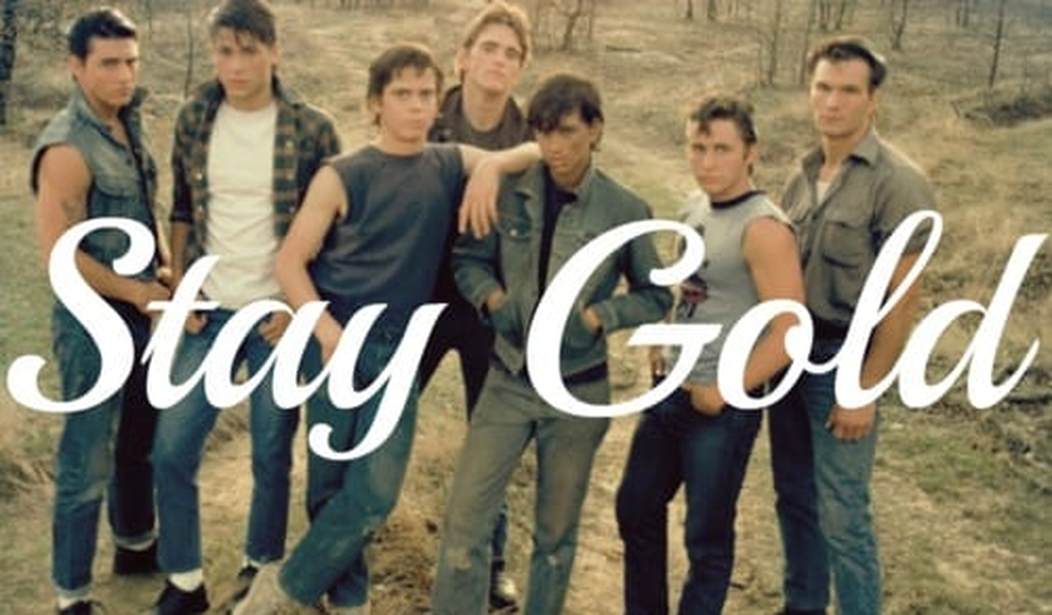Author S.E. Hinton may not be the household name that J.K. Rowling is, but those who came of age decades before Harry Potter likely recall writing book reports on Hinton’s bestselling novel: The Outsiders.
Hinton, writing a book in 1967 that depicted 1965 Oklahoma, did not intend to explore topics related to homosexuality with her book.
We know this because … well, because the book does not explore topics related to homosexuality.
Still, some modern-day readers were apparently interpreting a relationship between two characters in the book as being homosexual. Why?
Because to Social Justice Warriors, everything is politicized. The Outsiders must either advance a “progressive” message, or be evil crap.
On Twitter, someone asked Hinton directly: are the characters Johnny and Dally more than just buddies? After all, they do say they “love” each other.
Hinton replied:
@MrCadeWinston No. Where is the text backing this?
— S. E. Hinton (@se4realhinton) October 17, 2016
Also:
@MrCadeWinston ask someone in the ’60’s how “cute” it was to be gay. I have many friends I love & do not want to sleep with.
— S. E. Hinton (@se4realhinton) October 17, 2016
Of course, Hinton’s points are objectively true. She dismisses the idea that expressions of love must imply romantic love, and states that mainstreaming homosexuality was just not a big thing in the early 1960s. She seemed a little bothered that a topic she clearly did not mean to include in her book was being read into it.
Stating this, of course, launched an onslaught of HATE from the SJW crowd that inundated Twitter:
Whenever you realize @se4realhinton is trash & you gotta throw out your copy of The Outsiders
— Gabbie . (@reldnahcbing) October 18, 2016
I’m so furious at @se4realhinton and her homophobic bullshit. The way she’s treating readers is abhorrent, too. https://t.co/w6kolFBVyU
— El @ Just Love (@justloveromance) October 18, 2016
@StatistsAnon @se4realhinton Lots and lots and lots of people found her to be homophobic. And those are the people who gets to decide.
— Shannon LC Cate (@lilysea) October 22, 2016
@true198 @christineannlak @se4realhinton and yes, if the idea that people may think your characters are gay “bothers you” that’s homophobic.
— Strahd’s Advocado (@EvilGuacamole) October 20, 2016
There are many more where these came from.
The problem here isn’t unusual, however. Hinton isn’t the first artist to deal with this hateful nonsense.
In May, an article ran in Vanity Fair decrying a scene from the film Captain America: Civil War. Apparently, Captain America kissing Sharon Carter somehow ruined the movie because it meant that he wasn’t gay:
“People can interpret the relationship however they want to interpret it,” Joe Russo said while visiting China. “People have interpreted that relationship all kinds of ways, and it’s great to see people argue about it what that relationship means to them. We will never define it as filmmakers, explicitly, but however people want to interpret it they can interpret it.”
But despite what Joe Russo said, doesn’t Captain America: Civil War go out of its way to “define” Bucky and Steve’s relationship when Cap smooches Sharon Carter (Emily VanCamp) while Bucky looks on approvingly? Where’s the room for interpretation in that moment? And, leaving aside the vague creepiness of Steve making a move on Peggy’s (very willing) niece, the moment itself wasn’t necessary to the flow of the movie at all.
Of course, the Vanity Fair piece completely ignores the fact that both Captain America and his best buddy were clearly interested in women during the first movie.
What’s especially amusing is that Vanity Fair is actually being un-progressive here: the filmmakers said they wouldn’t explicitly define the relationship, and Vanity Fair somehow figured a character kissing a woman rules out every other possibility except pure heterosexuality.
And here I thought the “B” in “LGBT” stood for bisexual. Guess not.
In both instances, however, people are upset because their agenda didn’t pan out. They can claim Hinton was “rude” all they want, but it’s clear they just didn’t like her factual answer. Just like the Vanity Fair author simply didn’t like how Cap and Bucky’s relationship worked out.
When people create works of fiction, you’re free to interpret them any way you want. But if you decide that the creators’ differing intentions mean you suddenly hate them and their work, you’re just a big jerk.









Join the conversation as a VIP Member